A bit of TLC for my oldest synthesizer: Jenny is getting a new potentiometer. As the synth’s pots were rather cheap, open types that gather dust, and are 40 years old now, they have become all scratchy and jumpy. As I have mentioned before, I am not the greatest fan of Kontakt spray and similar solvents/cleaners, so I bought replacements. But I never found the time to actually replace them.
This knob is a good place to start: The “glide” potentiometer is in charge of portamento, and it is one of the first things that might make Jenny fail (see Neil Johnson’s site). A faulty glide pot means that the synth will only ever play the same note regardless of which key you press. So I did replace that pot, which is pretty straightforward – you’ll find some pictures in this gallery. (It is a 2.2M linear type BTW.)
- The Glide pot is in the upper left corner of this picture. As you can see it is sitting on a small PCB together with the Noise switch and pot. Remove the knobs and the nuts from the axes of all three, and you can take out the board to replace the potentiometer.
- The pot needs to have a 10mm shaft and a 5mm diameter axis. Cut off the axis at about 10mm – which makes the distance from the end of the shaft to the top of the pot 20mm.
- Pot soldered and screwed to the PCB. Ready to re-insert and re-attach the board into Jenny’s panel.
Overview of potentiometer values
This is an overview of the potentiometer values, some of them are linear, some logarithmic, a few antilog. The most obvious candidates for replacement, apart from the glide pot, would be Frequency (100k) and Resonance (100k) for the filter, and Tune (10k).
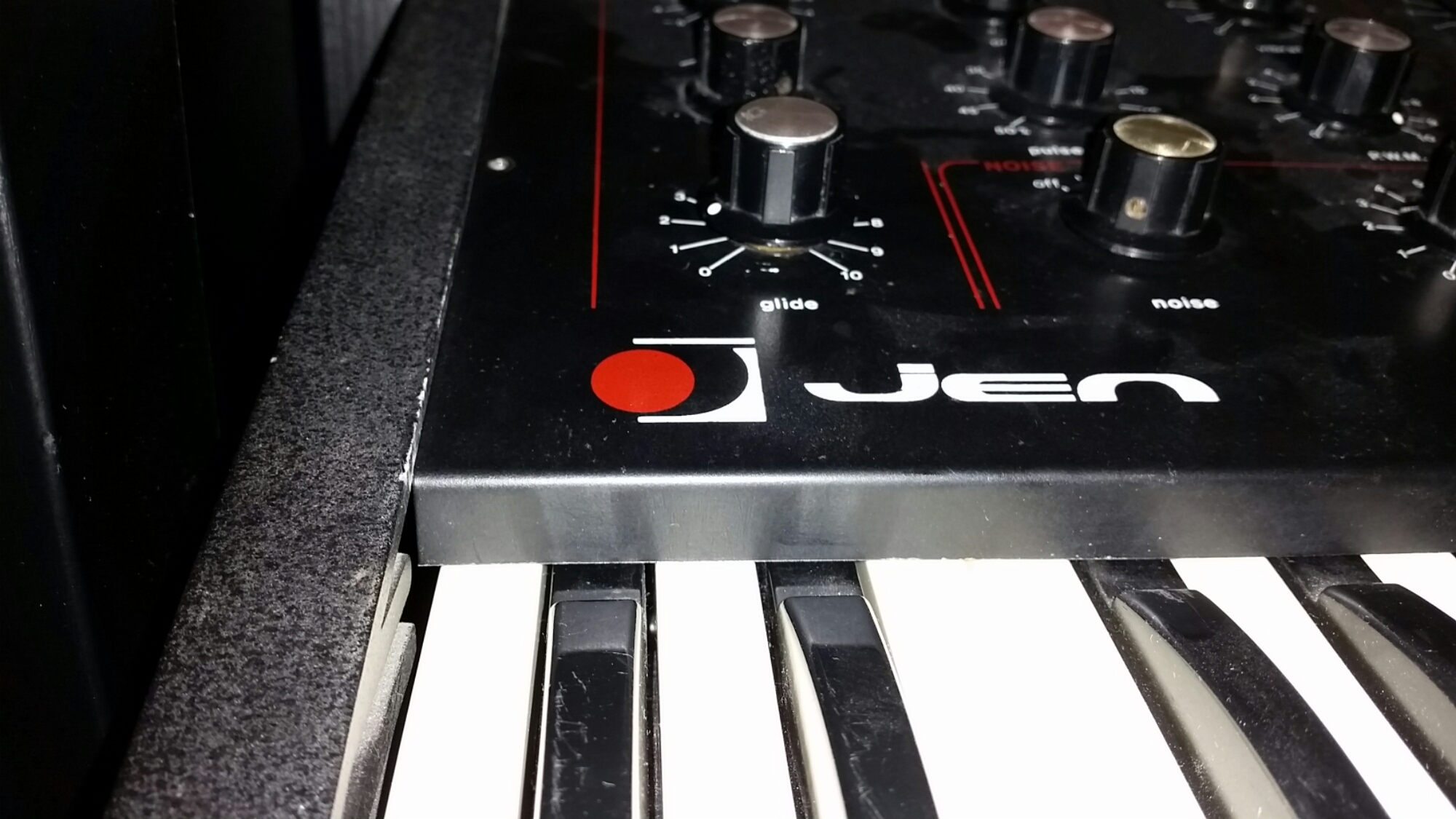
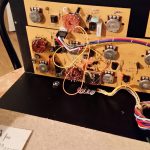
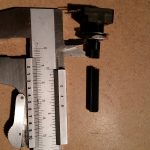
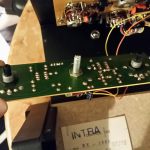
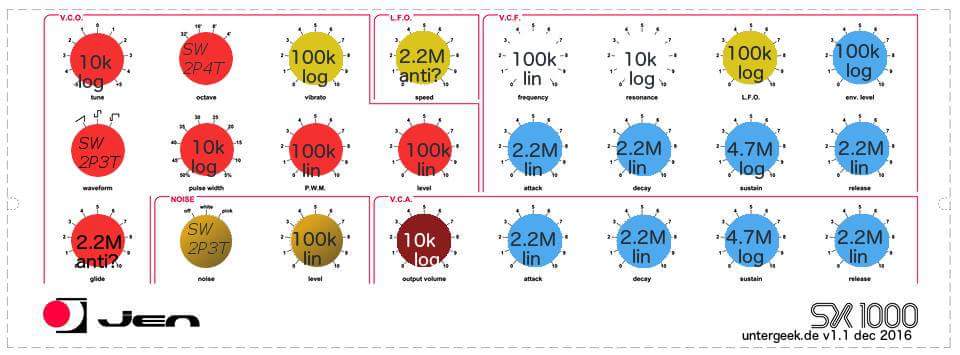
Hi,
Ich möchte gerne alle Potentiometer austauschen lassen.
Hast du eventuell noch Bestellliste für mich !?
Es wäre einfacher für mich.
Danke Dir !
Eugen aus der Facebook-Gruppe? Hallo :)
Leider ist das einzige, was ich noch finden kann, eine Bestellung beim Musikding – 10 Stück 100k lin, 4 Stück 10k lin, 2 Stück 10k log. Die 2,2M lin muss ich irgendwann früher schon bestellt haben. Und das war mit Sicherheit auch noch für andere Projekte – gleich’s mal mit meiner Karte ab. (Und tatsächlich habe ich bis jetzt als einziges das Glide-Pot ausgetauscht, und die Switches.)
Eine Beobachtung: Die Knöpfe passen nicht besonders gut auf die Achsen – möglicherweise ist es keine dumme Idee, mit den Potis alle Knöpfe auszutauschen. Dann ist man zum einen das leidige Problem mit den fehlenden Alu-Kappen los, zum anderen kann man die Knöpfe als Original-Vintage-Ersatzteile für EMS-VCS3-Fans versteigern… ;)
Hi, ja ich bin auch dort bei facebook in der Gruppe als Eugen. Ja ich danke dir für den Anfang, versuche die ganzen Sachen mal zu bestellen… Was bis jetzt bei mir funktioniert v.c.f , v.c.a. Octave geht ab und zu mal nicht ich tippe auf Oxidiation, Level geht auch. Bereich V.C.O ist ohne Funktion (außer Octave). Spannung überprüft, 3 Transistoren alles i.O.
Ach Eugen, … da bist Du ja. Habe hier im Urlaub einen Kollegen von Propellerhead-Software gefragt, der sich mit AnalogHardware auskennt (schliesslich teilen sich die Propellerheads und Nordlead einen Bau in Stockholm), … und er ist auch der Überzeugung, daß es mit dem Glide zusammenhängt ….. er fands aber eine irrige Idee, den Synth zu schicken ….. egal wie gut er verpackt war ….. aber das hätte man vorher wissen sollen.
In Köln gibts ja aber auch den M-Store, welcher bestimmt auch die alte Jenny wieder zum Schwingen bringt. Die haben echt ein paar gute Jungs da vor Ort !
Hi! Great blog post, I need to replace Leo speed pot as has snapped shaft, on the diagram it says anti? Does that mean it may be reverse log but not sure? Confused as says anti? for glide but then you say later that it’s linear 2.2M. Hoping it’s linear as able to find more easily lol. Found a 2M not 2.2 would that work? Thanks for your help :)
LFO not Leo that’s my boy’s name lol
2M should be OK. Have a look at Neil’s LFO mod, he was not impressed with the range of the LFO so he reconfigured the circuit, using a logarithmic 100k pot BTW.
Great thanks a lot for your reply, will try LFO mod in future but for now just want to get it working normally, would that be 2M logarithmic, reverse logarithmic or linear? Does it not work at iall if you use the wrong one? Thanks :)
It will. The difference between the characteristics – linear, logarithmic, anti-logarithmic – is in usability: How fast will the LFO speed change when you turn the dial? Jenny’s fathers decreed that it would be best for the aspiring synthesist if the LFO was controlled by an anti-logarithmic pot, but any other will work, of course. If only may be a bit tougher to get the result you want.
Thanks that is very useful exactly what I needed to know :)